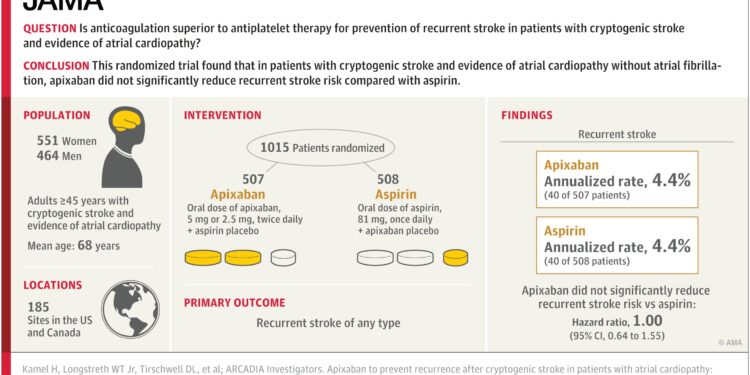Visual summary. Apixaban to prevent recurrence after cryptogenic stroke in patients with atrial heart disease. Credit: JAMA, (2024). doi:10.1001/jama.2023.27188
According to a study led by researchers at Columbia, Weill Cornell Medicine and the University of Washington and published in JAMA.
Blood thinners were thought to prevent further strokes in people whose initial stroke had an unknown cause but who had heart disease, atrial heart disease, which is similar to atrial fibrillation, a common cause of heart disease. ‘stroke.
“We know that these drugs work for people with atrial fibrillation, so we thought they would probably also work for people with atrial heart disease,” says Mitchell Elkind, MD, professor of neurology at the College of Physicians and Surgeons of Vagelos and one of the leaders of the study. “That was the basis of the trial.”
However, the trial of 1,015 people found that patients with atrial heart disease who received the blood thinner apixaban had the same rate of stroke, 4.4 percent, as patients who received aspirin, the current standard of care.
“As a physician-scientist, it is disappointing to not see your hypothesis proven, but this study nevertheless provides very useful information,” says Elkind. “It tells neurologists that patients with this type of heart disease, atrial heart disease, should not receive blood thinners, which are riskier than aspirin and should be reserved for people with definite signs of atrial fibrillation. “
The Mystery of Unexplained Strokes
A third of strokes have unknown causes, a challenge for neurologists trying to help their patients avoid future strokes.
“We know what to do with people with atrial fibrillation: we put them on blood thinners to prevent clots from forming. We know what to do with people who have a blocked carotid artery: we operate to open the artery.” , explains Elkind. “But for one in three people whose stroke is unexplained, there has always been uncertainty.”
Based on years of research, Elkind and a group of neurologists, including Hooman Kamel of Weill Cornell Medicine and colleagues at the University of Washington, thought they had found an answer: Many people who have unexplained strokes have changes in their hearts that resemble the changes observed. in atrial fibrillation.
Since these atrial changes appear to trigger clots like AFib and anticoagulants are successful in reducing strokes in patients with AFib, anticoagulants should also work to reduce clots and second strokes in patients with AFib. patients with atrial heart disease.
Several epidemiological studies have supported this idea, with the strongest data coming from a large stroke prevention study conducted by JP Mohr of Colombia in the 1990s. An analysis of blood samples stored as part of this study showed that anticoagulants were associated with fewer strokes in patients with biomarkers of atrial heart disease, but not in other patients with unexplained strokes.
For many doctors, the idea was compelling, even without the evidence from a prospective randomized trial. “If you thought your patient’s unexplained stroke really came from a cardiac embolism, the idea that you should prescribe blood thinners was hard to shake,” Elkind says. “And so a lot of people were using them.”
The right treatment for the wrong patients?
Elkind and Kamel say there are several possible reasons the trial didn’t support their hypothesis, including that they tested the right treatment in the wrong patients.
“In my mind, the next step is not to abandon the concept of treating atrial heart disease,” Elkind says, “but to see if there are indicators to better identify patients who would benefit from anticoagulants.”
The trial included patients who had one of three biomarkers for atrial heart disease, all associated with stroke risk, but the disease is not yet well defined and other biomarkers exist.
Another possibility is that other factors, including atherosclerosis, smoking or high blood pressure, were responsible for the participants’ unexplained strokes. If so, targeting atrial heart disease would not have a major impact on preventing subsequent strokes.
Researchers are currently discussing next steps, including the feasibility of future trials. “We need to know how many patients could actually benefit from this. Is this such a small proportion of patients that we wouldn’t be able to recruit enough patients? Elkind said.
“I would like to think that we’ve just taken half a step in the wrong direction, and that we just need to continue in a slightly different direction to identify the right patient population. So those are the kinds of questions that we still need to answer. answer. “.
More information:
Hooman Kamel et al, Apixaban to prevent recurrence after cryptogenic stroke in patients with atrial heart disease: the ARCADIA randomized clinical trial, JAMA, (2024). DOI: 10.1001/jama.2023.27188 jamanetwork.com/journals/jama/fullarticle/2814933
Provided by Columbia University Irving Medical Center
Quote: Blood thinners fail to prevent unexplained strokes, clinical trial results show (February 7, 2024) retrieved February 7, 2024 from
This document is subject to copyright. Apart from fair use for private study or research purposes, no part may be reproduced without written permission. The content is provided for information only.



